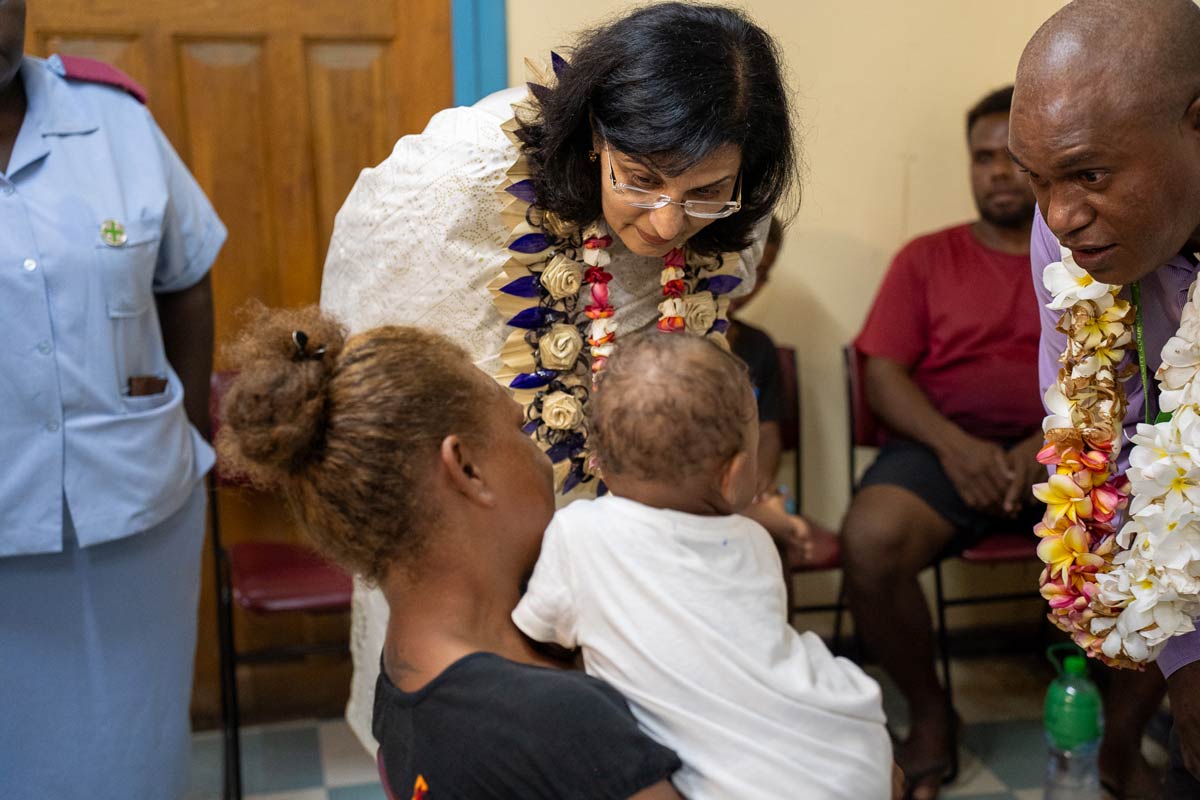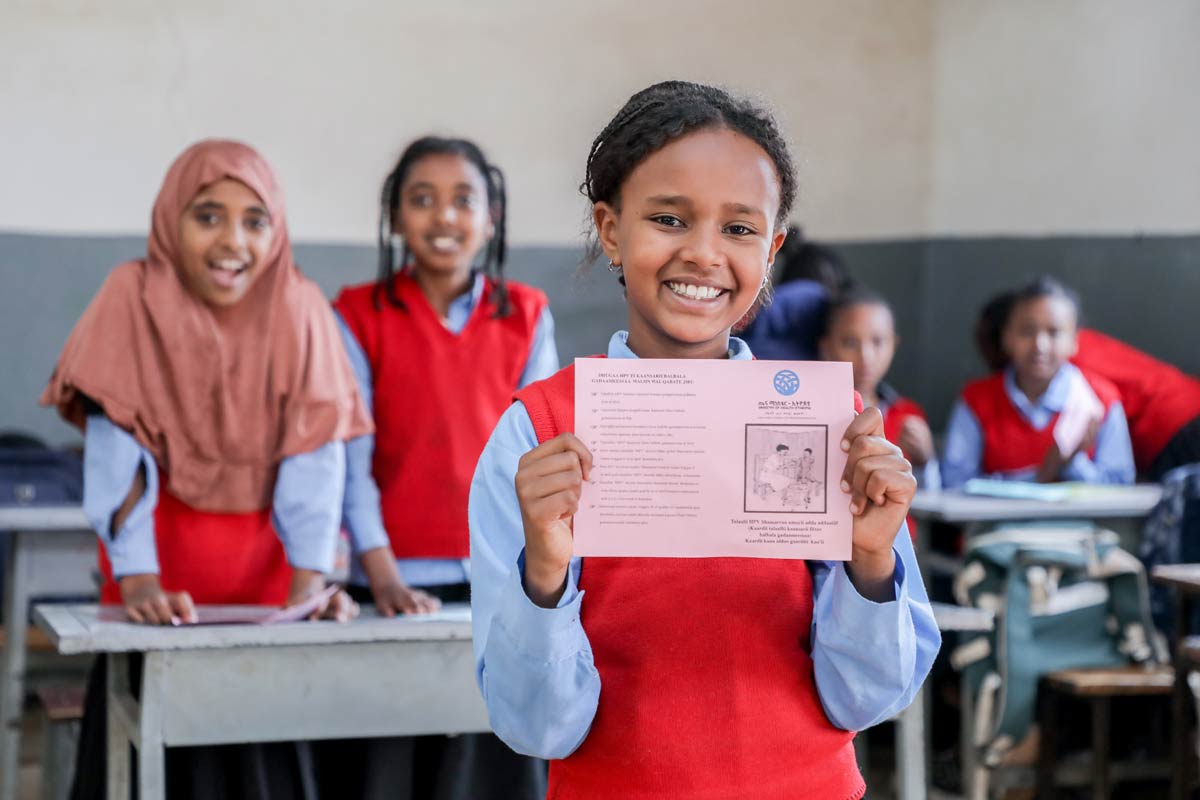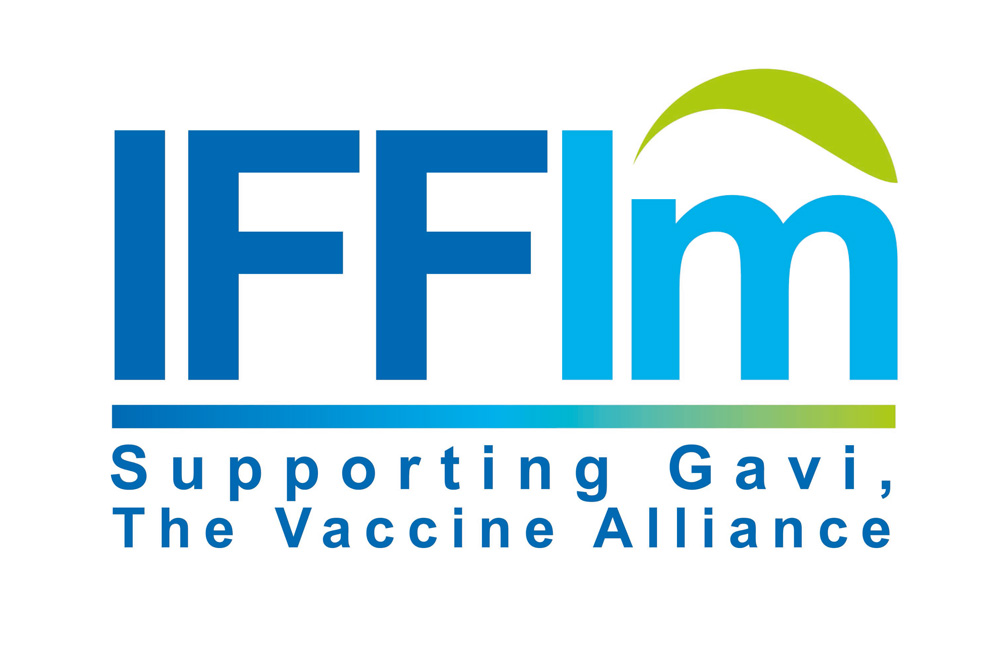IFFIm impact: HPV vaccine
A student from Kebron Academy, Holeta Town in Ethiopia holds her HPV vaccination card. IFFIm has contributed US$ 132 million to Gavi’s HPV programmes. Credit: UNICEF Ethiopia/2024
17 December 2024

Gavi CEO Dr Sania Nishtar visits with families in a clinic in the Solomon Islands. Credit: Gavi/2024
As countries face budget constraints, IFFIm will play a critical role in Gavi’s 2026-2030 funding.
For over two decades, Gavi has been at the forefront of global health, championing equitable access to vaccines, improving immunisation rates, reducing disease, and saving an estimated 18.8 million lives. Its results have been dramatic: Gavi programmes have cut child mortality in half since 2000. Now, as Gavi looks to the future, it aims to protect 500 million children in low-income countries, saving over 8 million lives between 2026 and 2030.
Gavi vaccinated 1.1 billion children between 2000 and 2024, and it has ambitious plans to accelerate its impact in the years to come by leveraging the latest innovations in vaccines and vaccine delivery to protect the next billion children in half the time as the first, and against more diseases, than ever before.
The stakes are high. Raising funding to reach the next historic milestone will require effort from all of Gavi’s partners and supporters, with donors being asked to provide at least US$ 9 billion in new funding. Because of its unique advantages to donors, IFFIm is poised to play a major role in fully funding Gavi’s next phase of work. In committing to IFFIm, donors will make an immediate impact on health outcomes today, with their contributions due in future years. This gives countries facing budgetary restraints a way to leverage future payments to make a difference today.
Taking IFFIm’s attractiveness to donors into account, Gavi is seeking to mobilise up to 20% of its overall resources for the 6.0 period through IFFIm. This represents US$ 1.9 to US$ 2.5 billion in new long-term donor pledges for IFFIm, as part of Gavi’s overall funding ask. By leveraging IFFIm, Gavi and its donors can make an outsized, faster impact, protecting millions of children and saving countless lives in the coming years.
IFFIm was established in 2006 as a new financing mechanism to help Gavi meet immediate and long-term immunisation funding needs. Its unique structure allows it to raise funds upfront by issuing bonds in the international capital markets, backed by long-term, irrevocable government commitments. This “frontloading” model enables Gavi to access substantial financial resources when they are most needed rather than waiting for incremental disbursements over time.
IFFIm effectively pools resources from eleven donor governments, including its largest and founding donors, the United Kingdom, Norway and France, each of which has made a long-term financial commitment to IFFIm. The result is a swift and efficient financing tool that allows Gavi to quickly respond to urgent public health needs.
IFFIm offers a compelling value proposition for donors, transforming long-term commitments from sovereign countries into immediate funding for critical immunisation programs. This innovative model eases short-term pressure on donor budgets, a vital advantage during periods of global fiscal constraints. With IFFIm, donors can lead the charge in global health today while spreading out the financial commitment over future years.
Donors also appreciate IFFIm as a flexible funding source for Gavi, especially for needs requiring accelerated upfront funding, such as during a pandemic or other health emergencies. This adaptability underscores IFFIm’s pivotal role in strengthening global health resilience.
As Gavi enters its next strategic cycle, the role of IFFIm is more crucial than ever. IFFIm’s contributions will help Gavi address challenges ranging from pandemic preparedness to ensuring vaccine equity in the most challenging environments. With IFFIm’s flexible financing and its innovative approach to funding global health initiatives, Gavi will be better positioned to reach its immunisation goals and ensure that millions more children receive life-saving vaccines.
The partnership between Gavi and IFFIm stands as an exemplar of what’s possible when financial innovation meets public health priorities. By contributing 20% of Gavi’s budget in this next cycle, IFFIm will play an instrumental role in ensuring that Gavi can fulfill its mission to protect future generations and build healthier, more resilient communities worldwide.

A student from Kebron Academy, Holeta Town in Ethiopia holds her HPV vaccination card. IFFIm has contributed US$ 132 million to Gavi’s HPV programmes. Credit: UNICEF Ethiopia/2024
The International Finance Facility for Immunisation (IFFIm) was initiated in 2006 to rapidly accelerate the availability and predictability of funds for immunisation. IFFIm uses government pledges to support the issuance of vaccine bonds sold to institutional and individual investors. The money supports vaccine programmes of Gavi, the Vaccine Alliance, a public-private partnership that works to save children’s lives and protect people’s health by increasing access to immunisation in developing countries. The World Bank is IFFIm’s treasury manager. IFFIm’s donors comprise Australia, Brazil, Canada, France, Italy, the Netherlands, Norway, South Africa, Spain, Sweden, and the United Kingdom.
Gavi, the Vaccine Alliance is a public-private partnership that helps vaccinate more than half the world’s children against some of the world’s deadliest diseases. The Vaccine Alliance brings together developing country and donor governments, the World Health Organization, UNICEF, the World Bank, the vaccine industry, technical agencies, civil society, the Bill & Melinda Gates Foundation and other private sector partners. View the full list of donor governments and other leading organisations that fund Gavi’s work here.
Since its inception in 2000, Gavi has helped to immunise a whole generation – over 1.1 billion children – and prevented more than 18.8 million future deaths, helping to halve child mortality in 78 lower-income countries. Gavi also plays a key role in improving global health security by supporting health systems as well as funding global stockpiles for Ebola, cholera, meningococcal and yellow fever vaccines. After two decades of progress, Gavi is now focused on protecting the next generation, above all the zero-dose children who have not received even a single vaccine shot. The Vaccine Alliance employs innovative finance and the latest technology – from drones to biometrics – to save lives, prevent outbreaks before they can spread and help countries on the road to self-sufficiency. Learn more at www.gavi.org and connect with us on Facebook and X (Twitter).
The World Bank is global development organization owned by 189 member countries. The World Bank’s mission is to end extreme poverty and boost prosperity on a livable planet. The World Bank is also the treasury manager for IFFIm. In that capacity, the World Bank manages IFFIm’s finances according to prudent policies and standards. This includes IFFIm’s funding strategy and its implementation in the capital markets, investment and risk management and managing the investor outreach and ratings agency relationships. The World Bank also coordinates with IFFIm’s donors and manages their pledges and payments as well as IFFIm’s disbursements for immunisation and health programmes through Gavi, the Vaccine Alliance. www.worldbank.org For further information please contact: World Bank as IFFIm Treasury Manager iffim@worldbank.org
Share this article
 The material in this Restricted Access Library is intended to be accessed only by persons with residence within the territory of a Member State of the European Union and is not intended to be viewed by any other persons. The material in this Restricted Access Library is provided by IFFIm for information purposes only and the materials contained herein were accurate only as of their respective dates. Certain information in the materials contained herein is not intended to be, and is not, current. IFFIm accepts no obligation to update any material contained herein.
The material in this Restricted Access Library is intended to be accessed only by persons with residence within the territory of a Member State of the European Union and is not intended to be viewed by any other persons. The material in this Restricted Access Library is provided by IFFIm for information purposes only and the materials contained herein were accurate only as of their respective dates. Certain information in the materials contained herein is not intended to be, and is not, current. IFFIm accepts no obligation to update any material contained herein.
Persons with residence outside the territory of a Member State of the European Union who have access to or consult any materials posted in this Restricted Access Library should refrain from any action in respect of the securities referred to in such materials and are otherwise required to comply with all applicable laws and regulations in their country of residence.
By clicking Access restricted content: DYNAMIC-LINK-TEXT I confirm that I have read and understood the foregoing and agree that I will be bound by the restrictions and conditions set forth on this page.
The materials in this Restricted Access Library are for distribution only to persons who are not a "retail client" within the meaning of section 761G of the Corporations Act 2001 of Australia and are also sophisticated investors, professional investors or other investors in respect of whom disclosure is not required under Part 6D.2 of the Corporations Act 2001 of Australia and, in all cases, in such circumstances as may be permitted by applicable law in any jurisdiction in which an investor may be located.
The materials in this Restricted Access Library and any documents linked from it are not for access or distribution in any jurisdiction where such access or distribution would be illegal. All of the securities referred to in this Restricted Access Library and in the linked documents have been sold and delivered. The information contained herein and therein does not constitute an offer for sale in the United States or in any other country. The securities described herein and therein have not been, and will not be, registered under the U.S. Securities Act of 1933, as amended (the "Securities Act"), and may not be offered or sold in the United States except pursuant to an exemption from, or in a transaction not subject to, the registration requirements of the Securities Act and in compliance with any applicable state securities laws.
Each person accessing the Restricted Access Library confirms that they are a person who is entitled to do so under all applicable laws, regulations and directives in all applicable jurisdictions. Neither IFFIm nor any of their directors, employees, agents or advisers accepts any liability whatsoever for any loss (including, without limitation, any liability arising from any fault or negligence on the part of IFFIm or its respective directors, employees, agents or advisers) arising from access to Restricted Access Library by any person not entitled to do so.
07 November 2025
